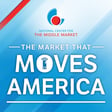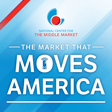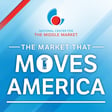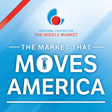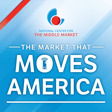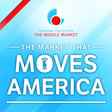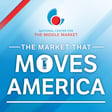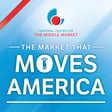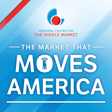Introduction to Middle Market Challenges
00:00:00
Speaker
In turbulent and uncertain times, middle market companies often look to their most trusted advisors for advice and guidance on how to make the best decisions, whether that be for managing their working capital, funding investments for future growth, or potentially even undergoing a significant business transition.
Strategies for Economic Challenges
00:00:19
Speaker
In this episode of The Market That Moves America, We'll talk to a senior executive in commercial banking about tips, advice, and strategy about how to navigate these issues and more.
00:00:32
Speaker
Welcome to The Market That Moves America, a podcast from the National Center for the Middle Market. The center is the leading source of knowledge, leadership, and innovative research on the middle market economy. Throughout our podcast, we will feature middle market leaders and stakeholders to hear their real-world perspectives on trends and emerging issues.
00:00:54
Speaker
Welcome to the Market That
Importance of Banking Relationships
00:00:56
Speaker
Moves America. My name is Doug Farron, Managing Director of the National Center for the Middle Market, located at The Ohio State union University Fisher College of Business.
00:01:06
Speaker
On this podcast, we take a look at a lot of different issues and talk with a lot of different experts on subjects that are particularly relevant to middle market companies.
00:01:17
Speaker
And there's probably none that is more important than the banking relationship.
Insights from Wells Fargo's John Manning
00:01:22
Speaker
So i'm very excited about today's conversation where I'll be welcoming John Manning of Wells Fargo Bank. John is the executive vice president and head of commercial banking market coverage.
00:01:36
Speaker
John, welcome to the podcast. Thank you, Doug, and thanks for ah for having me today. So can you tell us a little bit about yourself, your background, and and ah maybe more specifically about your current role with Wells Fargo?
00:01:51
Speaker
Certainly be happy to do that. In fact, today is my 31st anniversary with Wells Fargo. I'm proud to say that I'm a career commercial banker. i joined the bank 31 years ago and I've had a variety of different roles in the organization, really most always around our relationship business and commercial banking. So I was a relationship manager and progressed to be responsible for some of our markets in Southern California and then ultimately, more broadly, um businesses California.
00:02:27
Speaker
commercial banking along the east and west coast. And today I'm responsible for our relationship teams that are organized locally across 51 of our key markets across the country. And those teams are really there across each of those markets because we're set up in a way where we are trying to be as local as we possibly can for our client base.
00:02:52
Speaker
And so I have a business today that encompasses roughly 700 relationship managers across the United States. And those folks are delivering commercial banking products and services to our customer base.
00:03:07
Speaker
Wonderful. So I'm truly talking to ah someone with deep expertise. And before we go any further, I just want to start with getting your thoughts on what's going on right now in the macro economy, all the volatility that's going on.
00:03:24
Speaker
I know you personally have been talking to middle market companies. How are they reacting? and And also, how is Wells Fargo kind of reacting to everything that's going on? Yeah,
Impact of Market Changes on the Middle Market
00:03:35
Speaker
certainly. These are certainly volatile times and there's lots of unknowns out there.
00:03:40
Speaker
And you know what we're hearing, at least initially, and and frankly, um I completely understand that is this uncertainty is pretty real for everybody. And Every client is impacted in some way, um albeit in different ways based on industry and business model, but certainly um the the changes with trade policy and market volatility are things that are top of mind for our customer base. and to some degree i think uh it's relatively early today in terms of how all of this will come together and be real for our customers so folks are trying to i think take a step back and assess what the impact
00:04:24
Speaker
will be with trade policy for them going forward. And
Economic Volatility and Long-Term Planning
00:04:30
Speaker
certainly this continues to evolve in a real time fashion and is playing out today in the markets as we can see.
00:04:38
Speaker
But you know that market uncertainty can get in the way for some of long-term strategic planning. And that that's especially the case for our middle market customers where you know if there's a pivot or a change and a need to re-forecast,
00:04:54
Speaker
um with things being somewhat uncertain right now, I'm not sure that anybody feels comfortable with exactly how this is going to translate for them. This is in many cases, although different in a lot of respects, because this is trade policy. We did see this previously during the COVID pandemic, where There just weren't any historical events that were out there that we could compare to, to be able to guide of companies on how they may adapt.
00:05:25
Speaker
to these circumstances. So ah we are seeing a little bit of a a step back and an assessment happening and I would fully anticipate that over the next you know the coming weeks and months that we're going to start to see this evolve into you know folks being able to update forecasts and in some way plan for how they are going to adjust to some of the changes that they're seeing in the market associated with our trade policy.
00:05:54
Speaker
One thing that's important to me, though, and and what we're stressing to our teams is that you know we do we need to be very committed to you know cultivating um the relationships that we've got with our customers in a way where we're providing good insight for them as they evolve and and address kind of you know how they're going to manage their their businesses through these uncertain times. and And we're trying to stay as close as we possibly can to them here um because this is real time and people are generally in need of, you know, guidance or perspective that hopefully we as their financial partner are going to be able to provide to them.
00:06:40
Speaker
So would it be fair to say then that these companies should be try to be a little bit patient and maybe not overreact and make rash decisions, but take more of a wait and see approach?
00:06:52
Speaker
Yeah, I think, and look, it's going to be different. I think some folks may want to adjust or react if there was something planned relative to a potential capital investment or acquisition. Sometimes, you know, it's better to step back and and to assess what you know, you're going to do in light of some of the changes that are there. But certainly i think being patient and really making sure that people have an in-depth understanding of how this is going to impact them is is an optimal approach.
00:07:25
Speaker
Right, right. So kind of sticking on this theme of change, our center is we're in our 14th year and we have seen ah significant amount of change in the middle market over that time.
00:07:37
Speaker
Clearly, you've been in the financial services industry ah for a significant period as well. What are some of the big changes that you've seen over your career with the way that maybe middle market companies have shifted, changed, evolved in your experience?
00:07:55
Speaker
Yeah, that's a great question. i should start by maybe level setting a little bit around middle market companies, which represent roughly a third of the private sector g GDP and employ about 48 million people nationally.
00:08:11
Speaker
In many ways, they are the engine of our economy. And if I look back in my experience over 30 plus years of being a middle market banker, our clients have become much more sophisticated and they expect more, especially from their banking partners.
00:08:29
Speaker
They're actively engaged in looking at more digital solutions for things like payments and liquidity. um you know Definitely more focused around specialized capabilities, um which can help them in terms of like financing requests that they have of the bank. And looking at things that we do around providing those solutions to our clients Rather than kind of a one size fits all approach, a much more customized approach to um
00:09:03
Speaker
so the way that we manage the relationships, specifically on the financing side is something that I've seen evolve over time. We're also seeing our customers use many more business intelligence tools and analytics to make you know data-driven decisions that are going to help them drive sales activity and their operational strategy. And sometimes this is done in close collaboration with their banking partners, people like me and those on my team.
00:09:33
Speaker
um you know Lastly, I would just add that many of our middle market customers are more globally focused also today than they were many years ago. and even more globally connected um today. And while, you you know who knows, given the the current trade policy, how that will ultimately impact them globally, I don't think that we're going backward with people being entirely focused on the domestic economy. So um this is certainly a um something that's shifted and changed in my experience over the last 30 years.
00:10:10
Speaker
Interesting. So in our surveying of middle market owners, CEOs, executives, we often ask where these leaders go for best practices, information, advice to help them make better decisions. And almost...
00:10:27
Speaker
always the top um resource mentioned is their banker. It's their banker, their accountant, and their lawyer are typically the three that get mentioned mentioned most.
00:10:37
Speaker
And you lead a large team of of these relationship managers. So talk to us a little bit about why the importance of the banking relationship is so important for the middle market.
Unlocking Opportunities through Banking Partnerships
00:10:49
Speaker
Absolutely. Well, first, I couldn't agree with you more around the three individuals that companies typically reach out to. And you know for for us, the job of the relationship banker should be, um and always, in in my view, like what we strive to do is to help clients work through complex solutions and situations. And we are best positioned to understand the business, the business model, the objectives of ownership, and to be able to offer that insight and really covering the relationship strategically for us and really making sure that we understand the business strategy, the business model.
00:11:30
Speaker
It puts us in a really good place to be able to provide insight and opportunity and help companies unlock opportunities that are in front of them. Our relationship managers are not always a solution to the full suite of you know need that a ah potential customer may have. and And sometimes that involves bringing in the right partners and capabilities within Wells Fargo to help assist with solutioning around something. But there's certainly...
00:12:03
Speaker
adept at being able to recognize where those needs are coming from and really making sure that those relationships are cultivated not at the time that the need arises, but over a longer period of time is really critical. Because again, as I said, the understanding of the underlying business and the objectives of the owners of that business or the key decision makers within that business are really critical to to make to really being a great partner for our customer base and that while technology i would just say has advanced and solutions are more varied and sophisticated it ultimately comes down to these relationships at the end of the day and there's a trust
00:12:48
Speaker
and a consistency and confidence that people really um enjoy with their banker. You know, at Wells, we we try and be a really good partner for our customer base through cycles.
00:13:02
Speaker
We try to keep as much continuity and coverage of those relationships as we possibly can. And the average tenor of the relationships that we have in the commercial bank is significant um by design because that is a really important element of managing ah relationship effectively.
00:13:21
Speaker
Right. So the middle market, you know for us, we we've always held this expansive definition of companies with revenues annual revenues between $10 million and $1 billion, dollars which is a massive range. And so naturally, we get ah always get a lot of questions around, well, how yeah how do you compare the lower end and the upper end? And and certainly,
00:13:46
Speaker
Very, very different, right, in the way that those companies behave and operate and the decisions they're making. So in your experience, you know, thinking about that lower end of the middle market and the upper end of the middle market, maybe some of the key differences in your view and then maybe some of the trends that you're seeing, if if you are able to share that.
00:14:07
Speaker
Yeah, I mean, look, I would say there there are differences. In general, what i the common denominator is the importance of, you know, the the banking relationship tends to be there irrespective of the size of the of the customer and and the access that we get to people who are driving business.
00:14:27
Speaker
um The key decisions within the business continue to be important across each of the segments. The needs of the underlying company do vary based on where they are in the middle market in general. If you're looking at ah a smaller middle market business and you're dealing with an owner or a founder of that company and you're looking at you know, helping to identify a potential solution. It may be the first opportunity that company would have to do something internationally or globally or to look at a potential digital solution for something because there's been less exposure there for the business over a period of time. So you're educating people
00:15:12
Speaker
We're making sure people are aware of, you know, the value proposition associated with, um you know, what we're doing on their behalf and ensuring that um they are also appropriately focused on all of the risks and key elements of you know, some of the business strategies that they're undertaking. And while those things are are sometimes happening with larger customers and our customer base, that in general there, there's a bit more experience and sophistication around the business model because the companies are more scaled in size. And so
00:15:53
Speaker
while it continues to be important to to be in front of companies and to make sure that they're you know absolutely focused on um on the right set of products or capabilities or the that they're taking in kind of some of the key um elements of risks that are defined and and associated with a business strategy. I would say in cases like that,
00:16:21
Speaker
We're really just enhancing and helping to facilitate the business strategy because they're a bit more developed in the approach to what they're ultimately going to want to achieve. I would say...
00:16:37
Speaker
The underlying um differences are not as considerable as you might otherwise think they are between those customers, though. And I would say for us in covering the segments, you know there are differences in products and services that those companies need. but But on balance, there's not as many differences as you would otherwise think.
00:17:00
Speaker
ah That's interesting. Yeah, completely agree with a lot of your points. i think that was really well said. In terms of growth, ah again, one of the things we track here at at the center is monitoring the the growth rates of these companies. And what we love about the middle market is they they're very, very consistent.
00:17:20
Speaker
So, for example, in the last four years, kind of since 2008, you know the the pandemic, the average top-line growth rate has been around 12.5% the middle market. in the middle market so What we also hear though is how do how do you fund that?
00:17:37
Speaker
right So I'd be interested to hear you know what kind of approaches you see with companies are looking to say make a big investment, they want to buy some technology or they're looking to make either a domestic or international expansion.
00:17:52
Speaker
what are some of the ways that they go about you know accessing the capital they need to make that happen? Yeah, I mean, the the easiest way is to manage their own capital more efficiently. And so we're really focused in on, first and foremost, making sure that folks are optimizing their working capital and doing what they can to enhance their own ability to to fund businesses.
00:18:15
Speaker
the the growth that they're looking to undertake. But if you just look at that more broadly and you look at opportunities that are scaled in such a way where it will result in the company taking on some form of leverage over and above what's you know typically been the case within the business where they might have an operating line of credit and not much else in the way of of additional debt.
00:18:41
Speaker
There are a number of different financing vehicles that are available to companies to really facilitate outsized growth. And what's been interesting is outside of um bank capital directly, there is a a fairly robust market for alternative lenders with you know private credit here. And that could take the form of, know,
00:19:05
Speaker
both term loans as well as, you know, mezzanine credit or equity. And we've seen a lot of situations, particularly where there's significant events that are confronting a business at one time that are creating, you know, outsized leverage on their balance sheet, look to solutions that are both, you know,
00:19:28
Speaker
inside of ah of the bank's capability to to provide, but also more broadly in the in the market in terms of private credit that are available to them today that weren't historically available to middle market companies a few years ago.
00:19:47
Speaker
Great. So ah in addition to some of the themes we've already touched on, so you know globalization, supply chain, management, technology, talent, another really big theme that we've been keeping our eye on is around business transitions.
00:20:04
Speaker
um There's a statistic out there that there's a potential for upwards of half of the middle market to undergo some type of significant leadership or ownership transition in the next few years.
00:20:17
Speaker
I was very curious as to how your teams talk to clients about how they prepare and manage this type of an event, because the analogy isn't like selling a car, it's maybe like selling a home.
00:20:29
Speaker
You may only do it you know once or twice, maybe depending on how often you relocate, but It's not something that a lot of owners may have a lot of experience doing. So I'd like to hear how Wells Fargo helps with that process.
00:20:43
Speaker
Sure. I mean, and I would say a couple things. The first is, um and I can say this as a tail end baby boomer, we have an enormous amount of wealth transition that will take place between generations of business or where there's not a logical um next generation that may result in the sale of a business just, you know, happening right now, just given the age of baby boomers.
Wealth Transition and Strategic Opportunities
00:21:10
Speaker
and And that's a real issue for many companies. In addition to that, there's an enormous amount of capacity in the market, whether it be through a strategic buyer for companies that provide a great combined solution for a business that might be more limited within the specific company.
00:21:29
Speaker
geography or a specific product line that with a strategic partner would otherwise improve the overall performance of the underlying business, like that may cause someone to to think about doing something.
00:21:46
Speaker
So those are always situations that are top of mind. And then lastly, we've got a very robust sponsor market where um there's no lack of opportunity for key owners and principals of companies to entertain sponsorships.
00:22:04
Speaker
potential sales of their business where that might not even be on the top of their radar today, but they have somebody reach out to them and then all of a sudden it becomes real. So for us, it's very, very important to really understand and work closely with our customers around what their objectives are.
00:22:23
Speaker
in each of those situations and what they're looking to try and accomplish. And then importantly, to the extent that there is and opportunity for the sale of the business. I know at Wells, we we have a ah fully built out investment banking, middle market M&A practice, and we certainly will in situations absolutely ensure that those folks are engaged and talking with our customers to help them with true you know m and a advisory.
00:22:54
Speaker
um input and put an activity that they really should know and and be aware of and in terms of all of the the potential opportunities that are there. But you know putting that aside and just looking at working with families and working with with owners of businesses as they look at transition, and we do try and help them evaluate what what the right ultimate outcome is. And sometimes, you know,
00:23:25
Speaker
That is the sale of the business. Sometimes it it could be that they look at, you know, not doing something and taking a dividend. But if it is the sale of the business, then, you know, we want to make sure that in addition to providing the resources around the M&A advisory business that we're also looking at,
00:23:42
Speaker
engaging our wealth and investment management team as well, because there are enormous opportunities for liquidity events for families and making sure that we're planning around that early on in the process is going to be really, really helpful to them, both from an estate planning standpoint, from a tax standpoint, and and ensuring that the resources are around and surrounding our customer base is really critical early in that process.
00:24:11
Speaker
Right, right. So to close out our discussion today, John, I'm to put you on the spot a little bit, and that's for for any middle market you know business leaders that are listening to to this podcast and our conversation.
Guidance Amid Economic and Trade Shifts
00:24:26
Speaker
What would you tell them about navigating the coming days and months as we you know kind of continue on through 2025? What would be you know some things that you could share in terms of of how to think about the rest of the year?
00:24:39
Speaker
I would have said to you if I was two weeks ago, maybe I would have had a slightly different answer, but I was thinking and to myself, okay, as you were reciting the question, what would I advise? I would say this, stay the course.
00:24:52
Speaker
Great companies are always and should always be prepared to manage through cycles. We're here certainly for our client base to help them do that, but stay the course, prepare to manage through a variety of different cycles. If you look at just where we've been since the great financial crisis and the near past here, and so we're talking over the last decade,
00:25:14
Speaker
17 years, we've seen a a huge financial crisis, a pandemic, and now massive shifts with trade policy. And the ability of companies to manage through that is really, really important. So always be prepared. I'm very i'm feeling very good on balance.
00:25:33
Speaker
um Our middle market customers and and broadly the middle market ah companies across the U.S. are very well positioned to manage through the cycle, but super important to do that.
00:25:46
Speaker
We're all dealing with uncertainty and market volatility right now. But, you know, just speaking for myself um here, just experience and ah working through years of cycles in and out of different markets. In general, it's best to take a longer term approach.
00:26:05
Speaker
And i would highly encourage people to reach out if they haven't done so, to talk with their banking partners around you know the challenges you're experiencing and how that potentially is impactful to your goals.
00:26:20
Speaker
And having those conversations, even though today there might not be a near term reason for that, it's always good to do that. And I would highly encourage people to do that selfishly as a banker. I think that's a great best practice.
00:26:37
Speaker
Well, John, this has been fantastic. I truly appreciate you taking some time to to chat with me and share all of your great insights and perspectives with our audience, who I think will benefit you know tremendously from hearing some of the the things that you had to say about the various topics that we were able to cover. So again, thank you for being on our podcast.
00:26:58
Speaker
Doug, thank you for having me today. appreciate it. For more information about Wells Fargo and their commercial banking, please go to wellsfargo.com and we will talk to you soon. Thanks.
00:27:14
Speaker
Thank you for listening to The Market That Moves America. Never miss a new episode by subscribing anywhere podcasts can be found. You can also subscribe to our email newsletter at middlemarketcenter.org.

